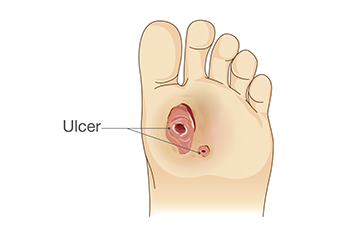Items filtered by date: September 2024
Why Your Feet Might Hurt After Playing Pickleball

Foot pain after playing pickleball is common, often resulting from the sport's physical demands. Pickleball involves quick lateral movements and sudden stops which can put significant stress on the feet. One major cause of foot pain is wearing inappropriate shoes that lack proper support and cushioning. Additionally, the sport’s repetitive motions can lead to overuse injuries, causing strain and discomfort. Playing on hard surfaces may worsen these problems by increasing impact forces on your feet. It is important to wear well-fitted, supportive footwear designed for pickleball and to pay attention to any signs of overuse. If you have endured a foot or ankle issue while playing pickleball, it is suggested that you visit a podiatrist who can offer effective treatment solutions.
Ankle and foot injuries are common among athletes and in many sports. They can be caused by several problems and may be potentially serious. If you are feeling pain or think you were injured in a sporting event or when exercising, consult with Elliot T. Udell, DPM from New York. Our doctor will assess your condition and provide you with quality foot and ankle treatment.
Common Injuries
The most common injuries that occur in sporting activities include:
- Achilles Tendonitis
- Achilles Tendon Rupture
- Ankle Sprains
- Broken Foot
- Plantar Fasciitis
- Stress Fractures
- Turf Toe
Symptoms
Symptoms vary depending upon the injury and in some cases, there may be no symptoms at all. However, in most cases, some form of symptom is experienced. Pain, aching, burning, bruising, tenderness, tightness or stiffness, sensation loss, difficulty moving, and swelling are the most common symptoms.
Treatment
Just as symptoms vary depending upon the injury, so do treatment options. A common treatment method is known as the RICE method. This method involves rest, applying ice, compression and elevating the afflicted foot or ankle. If the injury appears to be more serious, surgery might be required, such as arthroscopic or reconstructive surgery. Lastly, rehabilitation or therapy might be needed to gain full functionality in the afflicted area. Any discomfort experienced by an athlete must be evaluated by a licensed, reputable medical professional.
If you have any questions, please feel free to contact our office located in Hicksville, NY . We offer the newest diagnostic and treatment technologies for all your foot care needs.
Facts About Ankle Fractures

Ankle fractures occur when one or more of the bones in the ankle are broken, typically involving the tibia, fibula, and talus. The tibia and fibula are the main weight-bearing bones of the lower leg, while the talus sits between them and the heel bone, forming the ankle joint. Causes of broken ankles include trauma from falls, sports injuries, or accidents, as well as severe twisting or rolling of the ankle. Symptoms include sharp pain, significant swelling, bruising, and difficulty in bearing weight. The ankle may appear deformed or misaligned. Prompt medical evaluation is essential for proper diagnosis and treatment, which may involve immobilization, casting, or surgery depending on the severity of the fracture. If you have sustained an ankle fracture, it is suggested that you consult a podiatrist.
Broken ankles need immediate treatment. If you are seeking treatment, contact Elliot T. Udell, DPM from New York. Our doctor can provide the care you need to keep you pain-free and on your feet.
Broken Ankles
A broken ankle is experienced when a person fractures their tibia or fibula in the lower leg and ankle area. Both of these bones are attached at the bottom of the leg and combine to form what we know to be our ankle.
When a physician is referring to a break of the ankle, he or she is usually referring to a break in the area where the tibia and fibula are joined to create our ankle joint. Ankles are more prone to fractures because the ankle is an area that suffers a lot of pressure and stress. There are some obvious signs when a person experiences a fractured ankle, and the following symptoms may be present.
Symptoms of a Fractured Ankle
- Excessive pain when the area is touched or when any pressure is placed on the ankle
- Swelling around the area
- Bruising of the area
- Area appears to be deformed
If you suspect an ankle fracture, it is recommended to seek treatment as soon as possible. The sooner you have your podiatrist diagnose the fracture, the quicker you’ll be on the way towards recovery.
If you have any questions, please feel free to contact our office located in Hicksville, NY . We offer the newest diagnostic and treatment technologies for all your foot care needs.
Understanding Diabetic Foot Ulcers

Diabetic foot ulcers are sores or wounds that can develop on the feet of people with diabetes, often due to poor circulation, nerve damage, and prolonged pressure. These ulcers commonly occur on the soles of the feet and can become severe if not treated promptly. Symptoms include pain, swelling, and sometimes a foul odor if the ulcer becomes infected. Treatment for diabetic foot ulcers focuses on wound care and managing diabetes effectively. This involves cleaning the wound regularly, using specialized dressings, and offloading pressure with customized footwear or orthotic devices. In some cases, antibiotics may be needed to treat or prevent infection. For a comprehensive evaluation and tailored treatment plan, it’s suggested you make an appointment with a podiatrist. Their expertise can significantly improve outcomes and prevent serious complications from foot ulcers.
Diabetic foot care is important in preventing foot ailments such as ulcers. If you are suffering from diabetes or have any other concerns about your feet, contact Elliot T. Udell, DPM from New York. Our doctor can provide the care you need to keep you pain-free and on your feet.
Diabetic Foot Care
Diabetes affects millions of people every year. The condition can damage blood vessels in many parts of the body, especially the feet. Because of this, taking care of your feet is essential if you have diabetes, and having a podiatrist help monitor your foot health is highly recommended.
The Importance of Caring for Your Feet
- Routinely inspect your feet for bruises or sores.
- Wear socks that fit your feet comfortably.
- Wear comfortable shoes that provide adequate support.
Patients with diabetes should have their doctor monitor their blood levels, as blood sugar levels play such a huge role in diabetic care. Monitoring these levels on a regular basis is highly advised.
It is always best to inform your healthcare professional of any concerns you may have regarding your feet, especially for diabetic patients. Early treatment and routine foot examinations are keys to maintaining proper health, especially because severe complications can arise if proper treatment is not applied.
If you have any questions please feel free to contact our office located in Hicksville, NY . We offer the newest diagnostic and treatment technologies for all your foot and ankle needs.
The Connection Between Foot Pain and Hypothyroidism

Foot pain can often be a hidden symptom of hypothyroidism, a condition where the thyroid gland does not produce enough hormones. Hypothyroidism can lead to various complications, including peripheral neuropathy and fluid retention, both of which contribute to foot discomfort. Poorly controlled thyroid levels can cause nerve damage, resulting in tingling, numbness, or pain in the feet. Additionally, hypothyroidism often leads to fluid retention, causing swelling in the feet and ankles, which can increase foot pain. The reduced metabolic rate associated with thyroid dysfunction can also affect muscle strength and joint health, further contributing to foot issues. If you have a thyroid condition and are experiencing foot pain, it is suggested that you consult a podiatrist who can treat various foot ailments, in addition to determining if it is linked to thyroid disease.
When dealing with systemic disease of the feet, it is extremely important to check the affected areas routinely so that any additional problems are caught quickly. If you have any concerns about your feet and ankles contact Elliot T. Udell, DPM from New York. Our doctor will assist you with all of your podiatric needs.
Systemic Diseases of the Feet
Systemic diseases affect the whole body, and symptoms usually are displayed in the feet. This condition can make a patient’s ability to walk unbearable. Systemic diseases include gout, diabetes mellitus, neurological disorders, and arthritis.
Gout – is caused by an excess of uric acid in the body. Common symptoms include pain, inflammation, and redness at the metatarsal/phalangeal joint of the base big toe. Gout can be treated by NSAIDs to relieve pain and inflammation, and other drugs that lower the acid levels in the body.
Diabetes mellitus – is an increase in the level of blood sugar that the body cannot counteract with its own insulin. Failure to produce enough insulin is a factor in Diabetes.
Diabetes of the Feet
Diabetic Neuropathy – may lead to damaged nerves and affect the feet through numbness and loss of sensation.
Peripheral Vascular Disease – can restrict the blood flow to the feet, and often times lead to amputation of the feet.
If you have any questions please feel free to contact our office located in Hicksville, NY . We offer the newest diagnostic and treatment technologies for all your foot and ankle needs.

